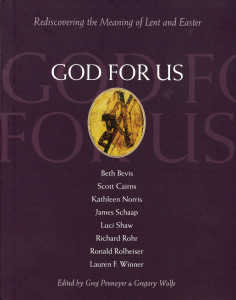 Two weeks ago I did a post, “Friday After Ash Wednesday,” with quotes from and comments on an entry from the wonderful book, God For Us. The authors are from diverse Christian faiths—including Catholic, Episcopal and Orthodox. One of the editors is Orthodox. Greg Pennoyer talks about the Lenten season in his preface to the book:
Two weeks ago I did a post, “Friday After Ash Wednesday,” with quotes from and comments on an entry from the wonderful book, God For Us. The authors are from diverse Christian faiths—including Catholic, Episcopal and Orthodox. One of the editors is Orthodox. Greg Pennoyer talks about the Lenten season in his preface to the book:
Lent’s reputation as a time for the “denial of the flesh,” for self-flagellation and a vaguely spiritualized gloominess, made it much more difficult to engage. But my entrance into Orthodoxy, a set of challenging personal circumstances, and the desire to produce this book impelled me to learn more about what the great Orthodox theologian Alexander Schmemann called the “bright sadness” of the Lenter and Easter season.
And so today I read the selection (on the Western Christian calendar) for the “Second Friday of Lent,” by Lauren F. Winner, an Episcopal priest. She writes about how uncomfortable the readings from the lectionary are during this season of Lent:
They discomfit. They tell me that: a)my wrong-doing matters to God and b)I have a chance to decide what I want to do about that wrongdoing…. I think about my erring ways, and I feel very alone, very far away from God, very far away from a friend, close only to the sin.
Her words would be depressing if she stopped there. If she didn’t continue to say that she is not alone:
So I will let the saints who have gone before remind me that I am not alone. I have friends, I have a church, I have a pastor, and, above all, I have a friend in Jesus.
One of those “friends” Winner calls upon to help with her lonely Lenten struggle is the poet George Herbert, who writes:
Perhaps my God, though he be far before,
May turn and take me by the hand and more,
May strengthen my decays.
Winner explains about how “decay” refers to what happens to the organic materials when they are transformed by decay into humus. She uses this metaphor as a spiritual lesson:
That is Lent: the transformation of our organic materials under controlled conditions so that our raw ingredients are transformed into humus—into life, into fertility.
Her words help me as I approach the Orthodox calendar for Lent, which begins on March 14 this year. I don’t look forward to the stricter fasting regimen or the longer church services. But maybe this year I’ll remember that I’m not alone. Even on days when I don’t want to leave the house. Or when I get disappointing news—as I did yesterday, when another literary agent turned down my request for representation for my novel. I take encouragement, again, from Pennoyer’s words in the preface to God For Us:
In Lent we learn that the meaning of life is not dependent upon the fulfillment of our dreams and aspirations. Nor is it lost within our brokenness and self-absorption…. Lent cleanses the palate so that we can taste life more fully. It clears the lens so that we can see what we routinely miss within our circumstances.
I hope to do more posts from this book during Lent. Here’s a teaser: an interview with Scott Cairns, an Orthodox poet and writer who contributes to the book.
I’m so thankful to these inspirational authors who are helping me avoid seeing Lent as “a vaguely spiritualized gloominess.”